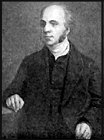Hide
hide
Hide
West Country Poets

JOHN KITTO, D.D., F.S.A. (1804-1854)
This remarkable man was born, in very humble circumstances, at Plymouth in 1804. His early life was spent amidst scenes of the greatest misery and degradation. KITTO was chiefly indebted to his grandmother for his bringing up, as she proved quite a mother to the child. His school-life was brief, uncertain, and frequently interrupted; but the boy early evinced an aptitude for study, and eagerly read all the books to which he could obtain access. He was at first apprenticed to a barber, then we find him assisting his father in his work as a mason. This latter fact it was that turned the whole course of his career. For in 1817 he fell from a roof, and was very much injured, and although he recovered in other respects, he never regained his hearing. He makes pathetic reference to this in his book, 'The Lost Senses.
In 1818 his grandmother died, and in the following year he was admitted into the Plymouth workhouse. Here the governor, Mr. ROBERTS, and his successor, Mr. BURNARD, befriended him, and put opportunities in his way of gaining knowledge, of which he fully availed himself. In 1823 he left the workhouse, and obtained employment at the Plymouth Library, where he was able to prosecute his studies. He then went to Exeter as assistant to a dentist, and from thence removed to London, as a printer in connection with the Church Missionary Society. This was in 1825. In 1827 he was sent to Malta, in connection with the Society, for the dissemination of tracts in various languages. Afterwards he went to Russia, Turkey and Egypt, and returned to England in 1833. We next find him acting in conjunction with Mr. Charles KNIGHT, the well-known publisher of cheap serials. In this way he assisted in compiling the Penny Magazine, the Penny Cyclopaedia, etc. From that time he was indefatigable in his literary labours, and produced many Biblical works of great excellence for a full account of which we must refer our readers to the published biographies. John KITTO, shoemaker, pauper, etc. had then become John KITTO, Doctor of Divinity and Fellow of the Society of Antiquaries, besides member of several foreign societies. He paid other visits to the East, and the result of his notes and observations may be discovered in the numerous works bearing his name, a list of which would occupy too much space for our present purpose.
Failing health necessitated his giving up work, and a fund was raised to comfort him in his declining days. He went to Germany , and died at Cannstadt on the Neckar, November 25, 1854, and was buried there. A handsome monument was erected in the Cannstadt cemetery by his friend and publisher, Mr. OLIPHANT, who published a very full and accurate biography, written by Dr. John EADIE. The only memorial to Kitto in his native town of Plymouth is a tablet affixed to a stone on the site of the place of his birth, Seven Stars Lane. His son, the Rev. J.F.KITTO, is at present Vicar of St. Martin in the Fields, London.
Dr. KITTO was not a large contributor to the poetry of his day, but the few pieces he has left behind him bear ample testimony to the fact that he had a talent in that direction. The following piece will, we think, prove our case:
ALTERNATIVE
Were all the beams that ever shone,
From all the starts of day and night,
Collected in one single cone,
Unutterably bright!
I'd give them for one glance of heave
Which might but hint of sin forgiven.
Could all the voices and glad sounds
Which have not fallen on my sense,
Be rendered up in hour's bounds-
A gift immense!
I'd for one whisper to my heart
Give all the joy this might impart.
If the great deep now offered all
The treasures in her bosom stored,
And at my feet I could no call
That might board!
I'd spurn it utterly for some
Small treasure in the world to come.
If the sweet scents of every flower-
Each one of which cheers more than wine-
One plant could from its petals pour,
And that were mine!
I would give up that glorious prize
For one faint breath from Paradise.
Were all the pleasures I have known,
'So far, so very far between',
Into one great sensation thrown -
Not then all mean-
I'd give it freely for one smile
From Him who died for me erewhile.
Transcribed by Sandra Windeatt from: Wright, W. H. K.,(1896) West-Country Poets: Their Lives and Works. London: Elliot Stock, pp.48-51
Note: There is more information about John Kitto in the book: GROVES, Harriet.: Memoir of the late A. N. Groves, containing Extracts from his Letters and Journals. By His Widow [H. N.]. London, 1856. - Information kindly provided by a correspondent.
